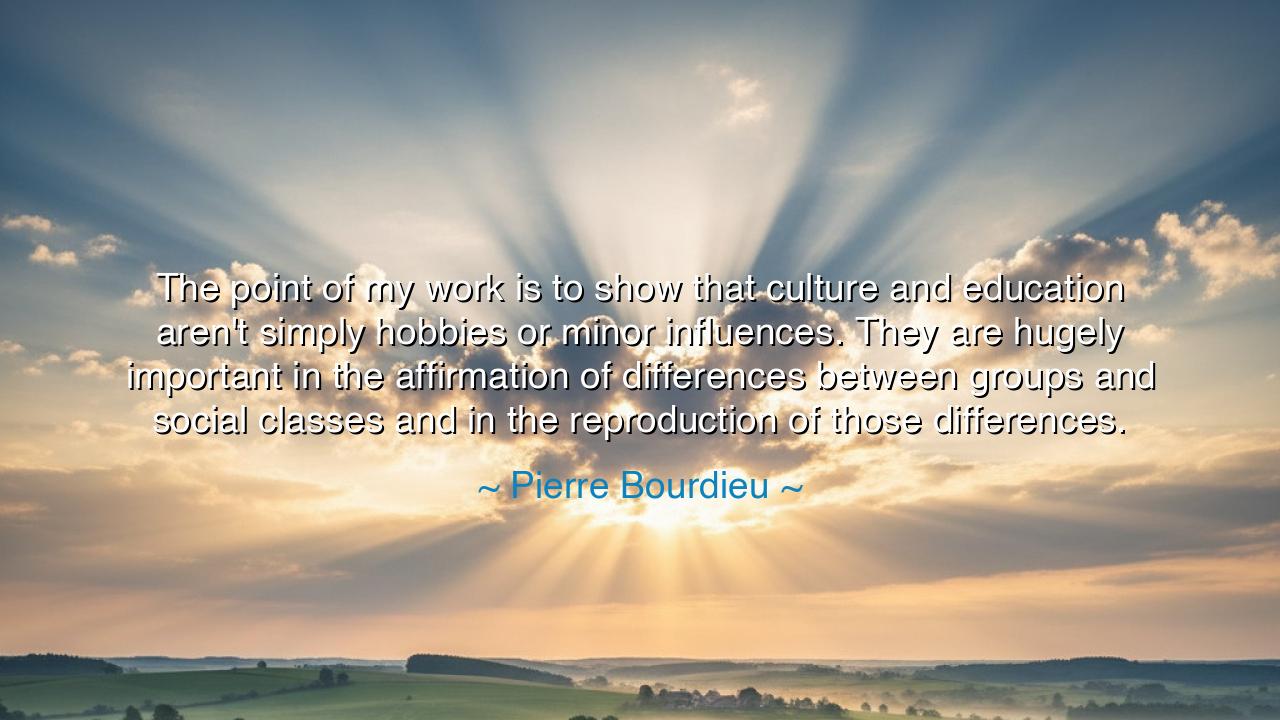
The point of my work is to show that culture and education aren't
The point of my work is to show that culture and education aren't simply hobbies or minor influences. They are hugely important in the affirmation of differences between groups and social classes and in the reproduction of those differences.






"The point of my work is to show that culture and education aren't simply hobbies or minor influences. They are hugely important in the affirmation of differences between groups and social classes and in the reproduction of those differences." These are the words of Pierre Bourdieu, the French sociologist who sought to unveil the hidden mechanisms that govern human society. In them lies a profound revelation: that what we call education is not merely the path to enlightenment, and culture not merely a pastime of refinement—they are forces of power, shaping destinies, dividing worlds, and maintaining the hierarchies of mankind. His insight was not born of cynicism but of clarity, for Bourdieu saw beneath the veil of merit and taste the enduring structures of inequality.
Bourdieu’s vision emerged in an age when Europe believed itself liberated by reason and opportunity. Schools were thought to be ladders to advancement; museums, theaters, and literature the treasures of civilization open to all. Yet he asked: why do the children of the rich so often remain rich, and the children of the poor so often remain poor? His answer was piercing. It was because education and culture, though seemingly neutral, carry the silent language of privilege. The habits of speech, the way one dresses, the kind of music one reveres—these are not mere personal preferences, but marks of class distinction. To be born into refinement is to inherit invisible armor; to be born without it is to enter battle unarmed.
Consider, for a moment, the story of Frederick Douglass, born into slavery in the 19th century. Forbidden to read, he risked his life to learn letters from scraps of discarded newspapers. When at last he gained the power to read, he said, “I now understood what had been to me a sealed book, to wit, the white man's power to enslave the black man.” Douglass saw that education itself was a weapon of liberation—but also of domination. Those who controlled knowledge controlled society. The same truth that freed him condemned others to remain bound. In this paradox, we find the heart of Bourdieu’s teaching: that education may elevate, but it may also entrench.
Throughout history, empires have understood this truth instinctively. The Romans educated the sons of conquered nobles in Latin and rhetoric, ensuring loyalty not through the sword but through cultural assimilation. In colonial times, schools were established not only to teach reading and writing, but to reshape thought—to make the colonized admire their masters and forget their own traditions. Thus culture became an instrument of rule, subtle and enduring. Bourdieu, with the mind of a philosopher and the eyes of a sociologist, laid bare this ancient machinery hidden in modern institutions. He showed that even the most civilized societies reproduce inequality not through decree, but through habits, tastes, and expectations passed down like heirlooms.
And yet, his message was not one of despair. For if education and culture can entrench inequality, they can also undo it. When access to learning becomes truly equal—not merely in word but in opportunity—then knowledge ceases to serve hierarchy and begins to serve humanity. When the arts are no longer the privilege of the elite but the expression of all, then culture transforms from a mark of class to a celebration of community. The same instruments that divide can, when guided by justice, unite.
Let this teaching be heard by all who walk the path of learning: be wary of mistaking education for virtue or culture for superiority. True learning humbles; it does not elevate one above another. True culture uplifts; it does not exclude. To study the classics is noble, but to use them to belittle others is corruption. To build schools for prestige is vanity; to build them for the poor is redemption. The wise do not hoard knowledge—they share it as a sacred trust.
Thus, Bourdieu’s words stand as both warning and call to action. If we are to build a just world, we must ensure that education nourishes every soul, not just the privileged few. We must honor culture not as a symbol of rank, but as the breath of humanity itself. Teach not only how to think, but also how to understand; not only what is beautiful, but why beauty belongs to all. For only when culture and education become tools of unity rather than distinction will humankind truly transcend the invisible walls it has built around itself.






AAdministratorAdministrator
Welcome, honored guests. Please leave a comment, we will respond soon